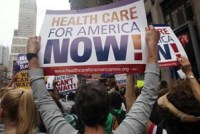Latest KFF Health News Stories
The Essential Benefit Package Americans Need
The real impact of reform will ultimately be measured by the health of the nation — and by that measure, few decisions are more important than what is included in the essential benefit package. How this package takes shape will determine whether health reform delivers on its promise.
Clinical Nuance Essential To Essential Benefits Package
Current “one-size-fits-all” health plans, in which beneficiaries face the same out-of-pocket payment for every doctor visit, test and prescription drug, should be be replaced by plans based on the health benefit gained in the particular clinical circumstance. By using this nuance, health plans can offer more comprehensive and effective coverage while addressing the affordability of health insurance.
Defining ‘Typical’: A Critical Step In Determining The Health Law’s Essential Benefits Package
As implementation of the 2010 health law unfolds, one of the most important questions surrounds how he essential benefits package will be determined. The answer will have a significant impact on the cost of coverage, both inside and outside the law’s insurance exchanges.
Analysis: Handicapping Health Care Lawsuits, And The Truth-In-Labeling Factor
Stuart Taylor puts the chances at about 25 percent to 33 percent that the health law’s individual mandate will be overturned, and adds that the court seems even less likely to sweep away the rest of the 975-page law.
Transcript: GOP Candidates Squabble Over Health Care During Tampa Debate
Monday night’s CNN/Tea Party Express debate among the Republican presidential candidates included discussion of Medicare, the health law, costs, the individual mandate and vaccines.
Health Insurers Deny Coverage To Many Who Apply For Individual Policies
Data from a federal website show that denial rates routinely exceed 20 percent and often are much higher.
Sweating The Details: Health Reform Supporters Fret Over HHS Rules
Some consumer and patient advocates worry that the administration is bending too much toward insurers and employers when it issues new health regulations.
Back-Up Plans For The Individual Mandate?
With this key health law provision’s constitutionality in question, Kaiser Health News asked six experts what alternative policy approaches might be used in its place.
Massachusetts Unions Shape Compromise For State’s Municipal Health Insurance Law
A coaltion of Massachusetts public employee unions recognized that municipal health care costs were a problem and engaged with other stakeholders in the effort to develop a solution. In the end, nobody got they wanted and that’s what a genuine compromise looks like.
These local jurisdictions, in the face of serious budget constraints, have repeatedly pushed for legal relief that would enable them to decrease the burden of public employees’ and retirees’ health benefit costs. Meanwhile, public employee unions have battled to protect what they believe their members have earned through their collective bargaining rights. In this state-policy drama, key players managed to come to a compromise that neither side loves, but both view as a solution.
Reasonable Reform Trumps In Massachusetts
Earlier this summer, Massachusetts Gov. Deval Patrick signed a new law reforming the way that cities and towns design health insurance plans for their employees. As local governments across the country continue to confront the harsh political and fiscal issues of spiraling employee and retiree health costs, the story of how this law came to be is worth examining.
Readers Face Multiple Dilemmas About Insurance Coverage, Costs
“Insuring Your Health” columnist Michelle Andrews answers questions from readers, including someone wondering about coverage if you’ve been drinking, talking with your insurer about a family member’s bill and preventive colonscopies.
As Hospitals Push ERs, States’ Medicaid Budgets Pressured
With their budgets squeezed, states are trying to reduce unnecessary ER visits by patients in Medicaid. But officials complain that their efforts are sometimes hampered by hospitals’ aggressive marketing of ERs to increase admissions and profits.
Workers Squeezed As Employers Pass Along High Costs Of Specialty Drugs
Employers struggling to keep down insurance costs are increasingly requiring workers to pay a percentage of high-cost drugs rather than a modest co-pay.
Health Insurers Seek Delay Of New Consumer-Friendly Coverage Forms
Shopping for health insurance next year will be easier, consumer advocates and government officials say. But the new materials are still a work in progress.
Insurance Experts Hope New Rules Will ‘Empower Consumers With Information’
Mila Kofman and Sabrina Corlette helped to develop the forms that HHS unveiled on Wednesday. The idea is to give consumers simple, clear and standardized information before they buy coverage – akin to nutrition labels.
New Standardized Insurance Forms Could Make Buying Easier
The head-spinning jargon and fine print common in many health benefit materials could disappear next spring as insurers and employers adopt plain-English models required by the government.
Q&A: Where Do I Find A Community Health Center?
Michelle Andrews, KHN’s “Insuring Your Health” columnist answers a question from an uninsured reader with a big health-care bill. She’s looking for advice on future care.
Insurance CEO Says Prevention, Collaboration Are Key To Controlling Costs–The KHN Interview
Bruce Bodaken of Blue Shield of California says encouraging patients to live healthier lives will help head off chronic disease and pay off in lower costs.



















